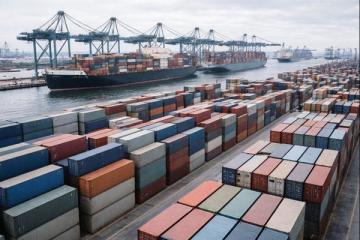
Digital adoption challenges leading to a lack of transparency, visibility and trust emerge as three key struggles for container logistic companies to book shipper-owned containers according to a survey by Container xChange, an online platform for container logistics and operations.
To examine the pain points of the current state of ocean freight booking, Container xChange joined hands with the Copenhagen Business School and surveyed with 137 freight forwarders and NVOCCs spread across the globe.
While the majority of freight forwarders shippers and NVOCCs use online quotation solutions, 83% find the need for better digital infrastructure in the future, pointing to digital vessel schedules and intuitive booking interfaces as the most impactful digital transformations in times to come.

Christian Roeloffs, co-founder and CEO, of Container xChange, shared that, “Lack of transparency and standardized digital processes has fueled inefficiency and mistrust for a very long time in the logistics industry. These struggles are further worse for shipper-owned containers where no carrier takes care of processes. This hinders the adoption of SOCs in the market. The survey corroborates with the state of the industry at present, but it is encouraging to understand how so many players are looking forward to Digital vessel schedules and intuitive booking interface for instance.”
“With the adoption of digital tools, all of this could be streamlined in a manner that there is a standardized procedure for all users. With digitization being at the crux of the whole booking cycle, the industry could become more efficient with streamlined vessel schedules, intuitive booking process, avoid scammers and gain trust in counterparties with vetted partners.” Roeloffs added.

Compared to Carrier-owned Containers, Shipper-owned Containers in principle provide more flexibility and can help users avoid hefty fees like demurrage and detention. However, the market has yet to fully adapt to SOCs in the same way as COCs when it comes to digital solutions. SOCs, being a fairly new concept, don’t have digitized slot booking processes and have a huge opportunity to connect to the fragmented ocean freight marketplace.
When it comes to ocean freight slot booking, Shipper-owned container users struggle more with getting accurate quotations, and confirmations of available capacity and end up booking with 5-10 shipping or feeder lines since there is no schedule reliability. Whereas Carrier-owned container users do have the liberty of getting administrative tasks like trucking, offloading, unstuffing, and so on taken care of and have digitized slot booking solutions in place, plenty of players still conduct the process manually with loads of emails and phone calls.
The main findings of the survey were:
-
More than 70% of the respondents find a lack of trust in their counterparts
-
Out of all the companies surveyed, 83% of them ranked digital vessel schedules on an importance level of 4 or 5, while 77% ranked intuitive booking interface in the same way. But industry players also want to have their document checklist and uploads visible and easy to use, as well as operational contact information ready at hand.
-
We observed that 84% of our participants still source quotations via email and phone, while 78% of them use the same outdated processes to place a booking.
-
At the same time, the fact that 60% also use online quotation solutions such as shipping companies' online booking interface (e.g., Maersk’s platform) shows that a market for digital SOC ocean freight booking exists.
The ocean freight market is still walking the old roads with slow manual processes. To get quotations and bookings, the industry still struggles with swift and easy processes. Outdated and manual processes also remain prevalent with companies still carrying out bookings via e-mail and phone.
For the slot booking process, instant booking and capacity confirmations were deemed the most important. And yet, many players are below satisfied with said service they receive.
Working on digital solutions to streamline the industry pain points, Adrian Degode, Senior Product Engineer, at Container xChange said, “The shipping industry is becoming increasingly digital but the biggest thing missing is trust. The caveat remains to be bringing all the solutions under one platform that simplifies the lifecycle of ocean freight spot booking while ensuring trust and transparency.”
“To enable the industry with an end-to-end solution, Container xChange is building a dynamic Ocean Freight Marketplace with transparent rates and trustworthy partners for Shipper-Owned Containers, where users get guaranteed slots on the vessel and supplier-guaranteed payments. From getting up-to-date vessel schedules and freight rates for your shipping routes to choosing and booking the best offer from trustworthy partners within minutes, the platform will bring a wide array of capabilities.”, he added.
Note to the editor:
Key findings of the survey
-
From quotation to booking, 40.9% of companies regularly place bookings with 5-10 shipping or feeder lines
-
When choosing a carrier, schedule reliability (77%), capacity availability (80%) and fast quotation (69%) were found to be the most important
-
In the quotation process, trust in counterparts (70%) also ranks as important, while satisfaction in this category is low-medium
-
To get both quotations and bookings, email and phone are still used as the main medium (75-85% of the time)
-
In the booking process, instant booking (76%) and capacity confirmation were deemed most important (79%), but currently, up to 32% of respondents are not satisfied with those two capabilities in existing solutions.
-
When booking online, digital vessel schedules (83%) and an intuitive booking interface (77%) were evaluated as the two most important factors overall





